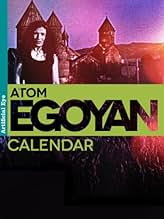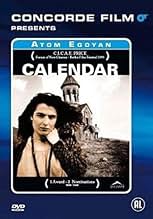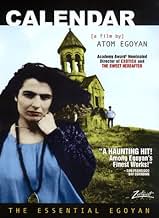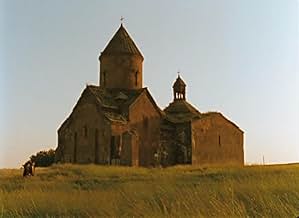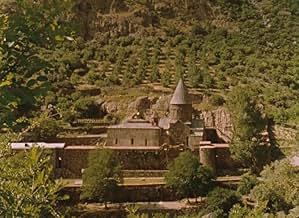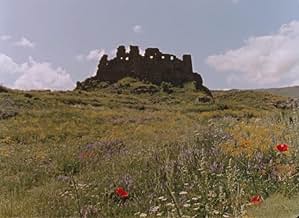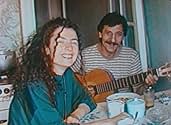Calendar
- 1993
- 1 Std. 14 Min.
IMDb-BEWERTUNG
6,7/10
2490
IHRE BEWERTUNG
Füge eine Handlung in deiner Sprache hinzuA woman stays in Armenia after her photographer husband completes his assignment and returns home to Canada.A woman stays in Armenia after her photographer husband completes his assignment and returns home to Canada.A woman stays in Armenia after her photographer husband completes his assignment and returns home to Canada.
- Auszeichnungen
- 1 Gewinn & 2 Nominierungen insgesamt
Empfohlene Bewertungen
'Calendar' is a slightly unusual film offering, written, filmed, directed, performed and possibly even fixed together with Scotch tape by Atom Egoyan, with this being my first trip into his cinematic world. It is a film that builds subtly, almost voyeuristically, so that the viewer finds themselves delving into the lives of its subjects to a level of prolonged discomfort, which reaches its crescendo as their true nature unfolds, all the while within some wonderful Armenian landscapes.
The plot concerns a Canadian-Armenian photographer returned to the land of his ancestors with the job of photographing his homeland's most picturesque churches for a forthcoming calendar. He is accompanied by his Armenian wife, acting as translator for the local driver and guide they have hired to provide them with background information on all the sites visited. The unassuming beginning suggests that this is more or less the sum-total of the film, but with every new location, we slowly learn of the deeply fragmented relationship present between the married couple and the cause of the ensuing distance between them. The way in which the film is shot helps to underscore this gulf, with the photographer never seen with his wife in the same place at the same time. Indeed, we only see him some time after the calendar has been printed, while we only see her during the photoshoot, very tellingly only in the company of the driver.
In some ways, 'Calendar' is rather difficult to watch, with the characters becoming more and more grotesque as the narrative progresses, especially that of the photographer, whose mounting jealousy (which could itself be described as a grotesque emotion) is exacerbated further by his unpleasant personality, particularly evident throughout scenes occurring in the present where, still emotionally in orbit around his estranged wife, he 'auditions' a long line of potential replacements (something that is not explicitly stated, so other viewers may have a different interpretation). Yet the film is shot in a very simple and effective way, which captures the claustrophobic mood of the piece while highlighting the wonderful natural backdrop. The camera is locked off in every scene, perhaps to mimic the still photography of the calendar itself, forcing the viewer to pay close attention to the tense and unspoken decay of the relationship. The still frame, accompanied by the subjects frequently in mid to long shot, further symbolize the distance felt by the man behind the camera and only serve to heighten his sense of isolation. These sequences are intercut with handicam footage of the characters' journey through Armenia, and yet despite providing the opportunity for motion, it is no more comforting, with the bluish tint and frequent lack of sound simply another form of isolation.
Egoyan is clearly a skilled photographer, and he lovingly captures the churches with the warmth and texture you would expect to see on a professional calendar. This only serves to heighten the contrasting coldness and unease created by the characters themselves, which Egoyan as the photographer and Arsinee Khanjian as the wife expertly create. It's certainly not a pleasant cinematic adventure, but anyone who has experienced that phase of a relationship will at least know the horrible awkwardness created between two people who were once close, and the helpless feeling of loss as a result. Unfortunately, drawn as he is, it is well-nigh impossible to sympathize with the protagonist's predicament, though his wife is by no means a victim.
The deeply personal discomfort, while real, does perhaps ensure 'Calendar' is probably not something I could sit through too often, but the effective minimalist approach on the production side and the jarring juxtaposition of cold, reserved knife-edge drama against the ultimately inconsequential polychromatic background has imbued a strong sense of the Atom Egoyan style. Certainly not a crowd-pleaser, but a director guaranteed to provoke thought. I'm certainly curious enough to explore some of his back catalogue some day. Actual rating 6 1/2 stars.
The plot concerns a Canadian-Armenian photographer returned to the land of his ancestors with the job of photographing his homeland's most picturesque churches for a forthcoming calendar. He is accompanied by his Armenian wife, acting as translator for the local driver and guide they have hired to provide them with background information on all the sites visited. The unassuming beginning suggests that this is more or less the sum-total of the film, but with every new location, we slowly learn of the deeply fragmented relationship present between the married couple and the cause of the ensuing distance between them. The way in which the film is shot helps to underscore this gulf, with the photographer never seen with his wife in the same place at the same time. Indeed, we only see him some time after the calendar has been printed, while we only see her during the photoshoot, very tellingly only in the company of the driver.
In some ways, 'Calendar' is rather difficult to watch, with the characters becoming more and more grotesque as the narrative progresses, especially that of the photographer, whose mounting jealousy (which could itself be described as a grotesque emotion) is exacerbated further by his unpleasant personality, particularly evident throughout scenes occurring in the present where, still emotionally in orbit around his estranged wife, he 'auditions' a long line of potential replacements (something that is not explicitly stated, so other viewers may have a different interpretation). Yet the film is shot in a very simple and effective way, which captures the claustrophobic mood of the piece while highlighting the wonderful natural backdrop. The camera is locked off in every scene, perhaps to mimic the still photography of the calendar itself, forcing the viewer to pay close attention to the tense and unspoken decay of the relationship. The still frame, accompanied by the subjects frequently in mid to long shot, further symbolize the distance felt by the man behind the camera and only serve to heighten his sense of isolation. These sequences are intercut with handicam footage of the characters' journey through Armenia, and yet despite providing the opportunity for motion, it is no more comforting, with the bluish tint and frequent lack of sound simply another form of isolation.
Egoyan is clearly a skilled photographer, and he lovingly captures the churches with the warmth and texture you would expect to see on a professional calendar. This only serves to heighten the contrasting coldness and unease created by the characters themselves, which Egoyan as the photographer and Arsinee Khanjian as the wife expertly create. It's certainly not a pleasant cinematic adventure, but anyone who has experienced that phase of a relationship will at least know the horrible awkwardness created between two people who were once close, and the helpless feeling of loss as a result. Unfortunately, drawn as he is, it is well-nigh impossible to sympathize with the protagonist's predicament, though his wife is by no means a victim.
The deeply personal discomfort, while real, does perhaps ensure 'Calendar' is probably not something I could sit through too often, but the effective minimalist approach on the production side and the jarring juxtaposition of cold, reserved knife-edge drama against the ultimately inconsequential polychromatic background has imbued a strong sense of the Atom Egoyan style. Certainly not a crowd-pleaser, but a director guaranteed to provoke thought. I'm certainly curious enough to explore some of his back catalogue some day. Actual rating 6 1/2 stars.
A small project wedged between his first two more mainstream products, The Adjuster and Exotica, Calendar stars the director and his wife, Arsinée Khanjian as a photographer and his wife. They are traveling to different Armenian churches in order to photograph them for a calendar. Both of them are Armenian by heritage, but he is disconnected from it, while she speaks the language (and acts as translator). During the trip, their Armenian guide begins to grow closer to the wife. The film actually takes place much later, as Egoyan, now no longer with his wife, is trying to duplicate her by holding "auditions" with women, presumably re-enacting the first meeting with his ex. It's all rather confusing. I never quite figured it all out. I'm not sure the film works. I liked all the stuff about the Armenian churches (some beautiful images here, and the film's style in these scenes is great), but the whole narrative about the dates never seemed to come to fruition. However, it is an extremely interesting film, and it's rather haunting at the end. Calendar itself may feel somewhat incomplete, but Egoyan is definitely a fully-fledged artist here. The only earlier film of his I've seen, Speaking Parts, did not communicate his talent. This is definitely worth seeing, especially as it only runs at 75 minutes.
A photographer and his wife take photographs of Armenian churches for use in a calendar. Their driver, a local resident, expounds on the history of the churches while the wife translates. The photographer becomes jealous of his wife's bonding with the driver.
This film seems to have near-universal acclaim, with one exception: a reviewer at a certain Washington newspaper who found the film to be too intelligent for the average viewer. Really? The plot is not that hard to follow, and you know what else? Not all movies need to be mindless entertainment.
I applaud Egoyan for making smart, and still good-looking, film. I have now seen most of what he has made, and I can't say he has really let me down yet. Some are better than others, but there are no duds. And this is far from a dud.
This film seems to have near-universal acclaim, with one exception: a reviewer at a certain Washington newspaper who found the film to be too intelligent for the average viewer. Really? The plot is not that hard to follow, and you know what else? Not all movies need to be mindless entertainment.
I applaud Egoyan for making smart, and still good-looking, film. I have now seen most of what he has made, and I can't say he has really let me down yet. Some are better than others, but there are no duds. And this is far from a dud.
Not Atom Egoyan's most 'story-driven' film, but his best from a purely aesthetic/cinematic perspective. His use of non-linear chronology, repeated scenes that slowly give way to understanding, and long drawn out takes that let you really start to feel the moment (how many viewers start to notice the slight differences in the various sheep, or look for their birthdays on the pages of the wall-calendar?) puts this film close to the level of Tarkovsky, Angelopolous, Bresson, etc.
While "Exotica" and "The Sweet Hereafter" are, understandably, his better known films (and good ones at that), "Calendar" works even better as the full realisation of theme and emotion using all the elements of cinema working in conjunction.
While "Exotica" and "The Sweet Hereafter" are, understandably, his better known films (and good ones at that), "Calendar" works even better as the full realisation of theme and emotion using all the elements of cinema working in conjunction.
This is a wonderful little film that I recently saw on a friend's recommendation, knowing virtually nothing about it except that I'd immensely enjoyed Atom Egoyan's "Exotica" and "the Sweet Hereafter". "Calendar" is not nearly as tragic as those two films; it concerns itself with the sadness of the disintegration of a relationship, but there is a subtle comedy to the film as well. The film is an experiment with a very specific, rigid, yet somehow apt structure: the film has twelve segments, one for each page of a beautiful calendar hanging by its photographer's phone. Laced into this structure is the story of the photographer and his wife's trip to Armenia, and the conflict that arises out of their different reactions to being in the land of their ancestry. It's all very well-told, and even though there is an element of inevitability, reinforced by the structure, the film never really strays into the realm of predictability. Finally, there are moments when the film seems to toy with breaking the sanctity of the fourth wall. This goes beyond the fact that the photographer and his wife are actually played by Mr. Egoyan and his wife. It's impossible to describe briefly and without spoiling the humor, though. If you're intrigued, check it out! You'll be glad.
Wusstest du schon
- WissenswertesThe film was mostly improvised, and made for barely $80,000.
- VerbindungenEdited into 365 days, also known as a Year (2019)
- SoundtracksBlue Feeling
Written and Arranged by John Grimaldi
Performed by Studebaker John and the Hawks
Top-Auswahl
Melde dich zum Bewerten an und greife auf die Watchlist für personalisierte Empfehlungen zu.
- How long is Calendar?Powered by Alexa
Details
- Erscheinungsdatum
- Herkunftsländer
- Sprachen
- Auch bekannt als
- Kalendern
- Drehorte
- Produktionsfirmen
- Weitere beteiligte Unternehmen bei IMDbPro anzeigen
Box Office
- Budget
- 80.000 CA$ (geschätzt)
- Laufzeit
- 1 Std. 14 Min.(74 min)
- Farbe
- Seitenverhältnis
- 1.85 : 1
Zu dieser Seite beitragen
Bearbeitung vorschlagen oder fehlenden Inhalt hinzufügen

